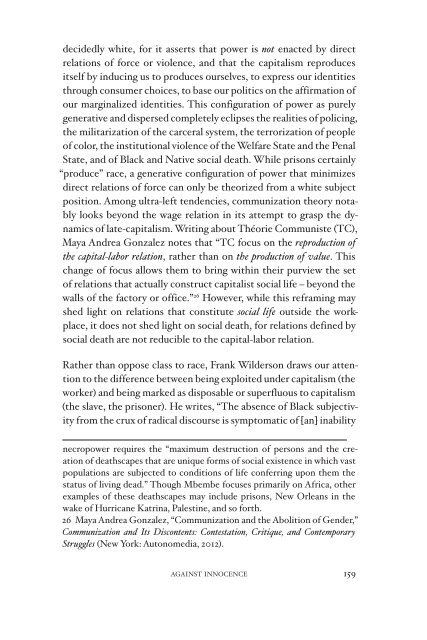Lies: A Journal of Materialist Feminism - Libcom
Lies: A Journal of Materialist Feminism - Libcom
Lies: A Journal of Materialist Feminism - Libcom
You also want an ePaper? Increase the reach of your titles
YUMPU automatically turns print PDFs into web optimized ePapers that Google loves.
decidedly white, for it asserts that power is not enacted by direct<br />
relations <strong>of</strong> force or violence, and that the capitalism reproduces<br />
itself by inducing us to produces ourselves, to express our identities<br />
through consumer choices, to base our politics on the affirmation <strong>of</strong><br />
our marginalized identities. This configuration <strong>of</strong> power as purely<br />
generative and dispersed completely eclipses the realities <strong>of</strong> policing,<br />
the militarization <strong>of</strong> the carceral system, the terrorization <strong>of</strong> people<br />
<strong>of</strong> color, the institutional violence <strong>of</strong> the Welfare State and the Penal<br />
State, and <strong>of</strong> Black and Native social death. While prisons certainly<br />
“produce” race, a generative configuration <strong>of</strong> power that minimizes<br />
direct relations <strong>of</strong> force can only be theorized from a white subject<br />
position. Among ultra-left tendencies, communization theory notably<br />
looks beyond the wage relation in its attempt to grasp the dynamics<br />
<strong>of</strong> late-capitalism. Writing about Théorie Communiste (TC),<br />
Maya Andrea Gonzalez notes that “TC focus on the reproduction <strong>of</strong><br />
the capital-labor relation, rather than on the production <strong>of</strong> value. This<br />
change <strong>of</strong> focus allows them to bring within their purview the set<br />
<strong>of</strong> relations that actually construct capitalist social life – beyond the<br />
walls <strong>of</strong> the factory or <strong>of</strong>fice.” 26 However, while this reframing may<br />
shed light on relations that constitute social life outside the workplace,<br />
it does not shed light on social death, for relations defined by<br />
social death are not reducible to the capital-labor relation.<br />
Rather than oppose class to race, Frank Wilderson draws our attention<br />
to the difference between being exploited under capitalism (the<br />
worker) and being marked as disposable or superfluous to capitalism<br />
(the slave, the prisoner). He writes, “The absence <strong>of</strong> Black subjectivity<br />
from the crux <strong>of</strong> radical discourse is symptomatic <strong>of</strong> [an] inability<br />
necropower requires the “maximum destruction <strong>of</strong> persons and the creation<br />
<strong>of</strong> deathscapes that are unique forms <strong>of</strong> social existence in which vast<br />
populations are subjected to conditions <strong>of</strong> life conferring upon them the<br />
status <strong>of</strong> living dead.” Though Mbembe focuses primarily on Africa, other<br />
examples <strong>of</strong> these deathscapes may include prisons, New Orleans in the<br />
wake <strong>of</strong> Hurricane Katrina, Palestine, and so forth.<br />
26 Maya Andrea Gonzalez, “Communization and the Abolition <strong>of</strong> Gender,”<br />
Communization and Its Discontents: Contestation, Critique, and Contemporary<br />
Struggles (New York: Autonomedia, 2012).<br />
AGAINST INNOCENCE 159

















